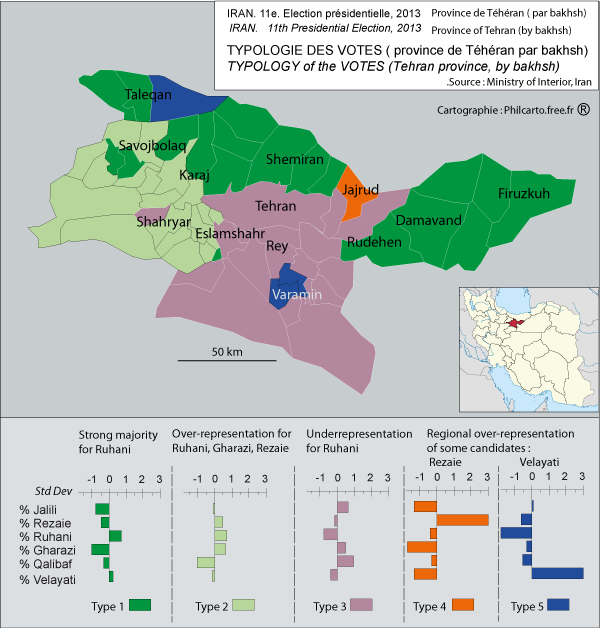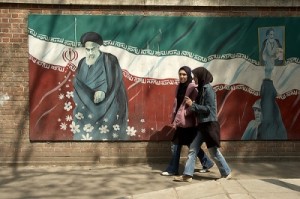by Jasmin Ramsey
The title of this post is a quote from Shaul Bakhash, a George Mason University professor who moderated a panel discussion, “Iran, the Next Five Years: Change or More of the Same?“ at the Wilson Center today. “In a way, we’ve been here before,” said the esteemed scholar, referring [...]]]>
by Jasmin Ramsey
The title of this post is a quote from Shaul Bakhash, a George Mason University professor who moderated a panel discussion, “Iran, the Next Five Years: Change or More of the Same?“ at the Wilson Center today. “In a way, we’ve been here before,” said the esteemed scholar, referring to the presidencies of centrist leader Hashemi Rafsanjani and Mohammad Khatami, when the country was perceived as moving towards openness at home and abroad. But while Iranian President Hassan Rouhani’s administration includes individuals with past ties to those movements, Bakhash says the conservatives “remain the strongest political body in Iran”.
While nothing can stay the same forever, many people worried (some still do) that the Islamic Republic would continue down a path of conservatism verging on radicalism before the surprise presidential election of Rouhani in June 2013. Since Rouhani took over from Mahmoud Ahmadinejad — whose former conservative allies couldn’t effectively unite in time to support another conservative into the presidency — those worries have changed. Now the question on everyone’s mind is: can Rouhani successfully navigate Iran’s contested political waters in his quest to implement foreign, economic and social policy reforms?
A lot depends on Iran’s 2016 parliamentary elections, according to panelist Bernard Hourcade, an expert on Iran’s social and political geography. “Elections matter In Iran”, said Hourcade, echoing Farideh Farhi. What happened in 2009 (when large groups of Iranians protested the election of Mahmoud Ahmadinejad and were violently repressed) proved that “elections have become a major political and social item in [Iranian] political life.”
 Hourcade uses official data to back up that point. Most interestingly, he shows that due to population migration patterns, the most important political divisions no longer exist between Iranian cities and villages, but between city centers and suburbs. Consider, for example, the typology of presidential votes for Rouhani in Tehran province. Hourcade’s diagram shows that while Rouhani had strong support in the northern part of Shemiran, he didn’t get a majority in central Tehran. Why that occurred is more difficult to answer, according to Hourcade, due to limited data resources.
Hourcade uses official data to back up that point. Most interestingly, he shows that due to population migration patterns, the most important political divisions no longer exist between Iranian cities and villages, but between city centers and suburbs. Consider, for example, the typology of presidential votes for Rouhani in Tehran province. Hourcade’s diagram shows that while Rouhani had strong support in the northern part of Shemiran, he didn’t get a majority in central Tehran. Why that occurred is more difficult to answer, according to Hourcade, due to limited data resources.
How political divisions play out in Iran’s upcoming parliamentary elections, which could give Iran’s currently sidelined conservatives more power, will also impact the Majles’ (parliament’s) reaction to the potential comprehensive deal with world powers over Iran’s nuclear program.
In other words, even if Iran’s rock star Foreign Minister can negotiate a final deal with the P5+1 (the U.S., Britain, France, China, and Russia plus Germany) that Supreme Leader Ali Khamenei approves, Iran’s parliament still has to ratify it, and if conservatives who oppose Rouhani dominate the majles, we may have another problem on our hands.
There were many other important points offered by Hourcade and his co-panelists, including Roberto Toscano, Italy’s former ambassador to Iran. He noted that former President Mohammad Khatami didn’t have the same chances as Rouhani because he was “too much out of the mainstream”. Rouhani, a centrist cleric and former advisor to Ayatollah Khamenei, wouldn’t have won the presidency without pivotal backing by both Khatami and Rafsanjani. So, as Toscano argues, Rouhani is in the mainstream (for now). But whether he and his allies will be able to maintain support from these important players moving forward, especially in 2016, will seriously influence whether he, like Khatami and Rafsanjani will be ultimately sidelined, or achieve a presidential legacy in Iran like nothing we’ve seen before.
Photo: Iranian President Hassan Rouhani walks by former Presidents Mohammad Khatami and Hashemi Rafsanjani following his June 2013 presidential vicotry. Credit: Mehdi Ghasemi/ISNA
]]>by Barbara Slavin
A new poll following the election of Hassan Rouhani says that a majority of Iranians oppose Iran’s intervention in Syria and Iraq and believe that Iran is seeking nuclear weapons despite their government’s claims to the contrary.
The poll, released Friday (December 6) and conducted August [...]]]>
by Barbara Slavin
A new poll following the election of Hassan Rouhani says that a majority of Iranians oppose Iran’s intervention in Syria and Iraq and believe that Iran is seeking nuclear weapons despite their government’s claims to the contrary.
The poll, released Friday (December 6) and conducted August 26-September 22, of 1,205 Iranians in face-to-face interviews by a subcontractor for Zogby Research Services, also indicated that Rouhani had relatively lukewarm support at the time and that many Iranians would like to see a more democratic political system in their country.
The results jibe with the June presidential elections in which Rouhani won a bare majority of votes, albeit against half a dozen other candidates. Half of those polled after the election either opposed Rouhani or said that his victory would make no difference in their lives. This reporter gained a similar impression of Iranian skepticism about their new president during a visit to Tehran in early August.
Not surprisingly, given the impact of draconian sanctions and mismanagement by the previous Ahmadinejad government on the Iranian economy, the poll found that only 36 percent of Iranians said they were better off now than five years ago, compared to 43 percent who said they were worse off. However, the same percentage — 43 percent — said they expected their lives to improve under the Rouhani administration.
Among the most interesting findings were those related to foreign policy. The poll found that 54 percent believe Iran’s intervention in Syria has had negative consequences – perhaps a reflection of the financial drain on Iran of the war in Syria and of the unpopularity of the Bashar al-Assad regime. Nearly the same proportion of the Iranian population – 52 percent – also opposed Iranian involvement in Iraq, which is ruled by a Shi’ite Muslim government friendly to Tehran. Iranian activities in support of fellow Shi’ites in Lebanon and Bahrain were only slightly more popular, while only in Yemen and Afghanistan did a majority of Iranians say their country’s actions have had a positive impact.
Jim Zogby, director of Zogby Research Services, told IPS that Iranians know “Syria has become a huge problem in the world and they don’t want to have more problems with the world.” The low marks for ties to Iraq may reflect “lingering anti-Iraq sentiment” stemming from the 1980-88 Iran-Iraq war, Zogby said.
Iranian attitudes toward democracy and the nuclear issue were also interesting. While a plurality of Iranians (29 percent) listed unemployment as their top priority, a quarter of the population rated advancing democracy first
Other major priorities included:
- Protecting personal and civil rights (23 percent)
- Increasing rights for women (19 percent)
- Ending corruption (18 percent)
- Political or governmental reform (18 percent)
According to the poll, only a tiny fraction – six percent – listed continuing Iran’s uranium enrichment as a top priority. Yet 55 percent agreed with the statement that “my country has ambitions to produce nuclear weapons” compared to 37 percent who believe the government’s assertions that the program is purely peaceful. The Iranian government insists that it is not aiming to produce weapons and signed an agreement in Geneva November 24 to constrain its nuclear program in return for modest sanctions relief.
In a strong show of nationalism, 96 percent said continuing the nuclear program was worth the pain of sanctions. Only seven percent listed resolving the stand-off with the world over the Iranian nuclear program so sanctions could be lifted as their top priority and only five percent put improving relations with the United States and the West at the head of their list.
Zogby said it was not surprising that Iranians would give a low priority to the nuclear program yet “when you push that button [and question Iran’s rights], the nationalism takes off.” He noted those who identified themselves as Rouhani supporters were more inclined to affirm Iran’s right to nuclear weapons than Rouhani opponents — 76 percent compared to 61 percent.
The poll results, Zogby said, suggest that Iranians do not consider Rouhani an exemplar of the reformist Green Movement that convulsed the country during and following 2009 presidential elections, but rather as an establishment figure.
“His supporters are more in the hardline camp,” Zogby said.
]]>This lonely press briefing issued today by the United Nations about ongoing political imprisonment in Iran reminds us that the more the international community focuses on Iran’s nuclear program, the less attention is given to Iranian human rights. These rights are consistently endangered and violated not only by the Iranian [...]]]>
 This lonely press briefing issued today by the United Nations about ongoing political imprisonment in Iran reminds us that the more the international community focuses on Iran’s nuclear program, the less attention is given to Iranian human rights. These rights are consistently endangered and violated not only by the Iranian government, but by sanctions and threats of war too.
This lonely press briefing issued today by the United Nations about ongoing political imprisonment in Iran reminds us that the more the international community focuses on Iran’s nuclear program, the less attention is given to Iranian human rights. These rights are consistently endangered and violated not only by the Iranian government, but by sanctions and threats of war too.
Iran’s rial is once again in free fall while Iran and the United States remain in political gridlock. Bibi Netanyahu may have backed off his Iran campaign for now but is unlikely to stop agitating for conflict. Today during an event at the International Institute for Strategic Studies, Mark Fitzpatrick said that Iran is unlikely to change it’s stance prior to the Iranian presidential election in June 2013 because no one wants to grant Mahmoud Ahmadinejad a diplomatic success while he is in office. Fitzpatrick added that the West is likely to implement even more sanctions during to this time.
So while Iranians are being strangled by the Islamic Republic’s ever-present hand in their public and personal lives, so too ar they being forced to endure a strangulated economy that will only worsen. This feeling of impending suffocation — imposed from above and below — was at the core of Asghar Farhadi’s oscar-winning film “A Separation” which resonated so strongly with Iranians. In Iran the personal is political and vice versa while absurdity has become the norm.
In a recent interview with Nazila Fathi, the Iranian human rights defender Shirin Ebadi explained that war on Iran would “stir nationalistic feelings and rally the people behind the government to defend the country” as well as “save Iran’s rulers.” But she didn’t or couldn’t provide any indication as to what can be done to ease the burden being imposed on Iranians by their government and foreign governments.
“I don’t favor more sanctions against Iran, but I do not want to see the world ignore what the regime is doing to its people,” said Ebadi.
What then is in store for Iran’s people?
]]>